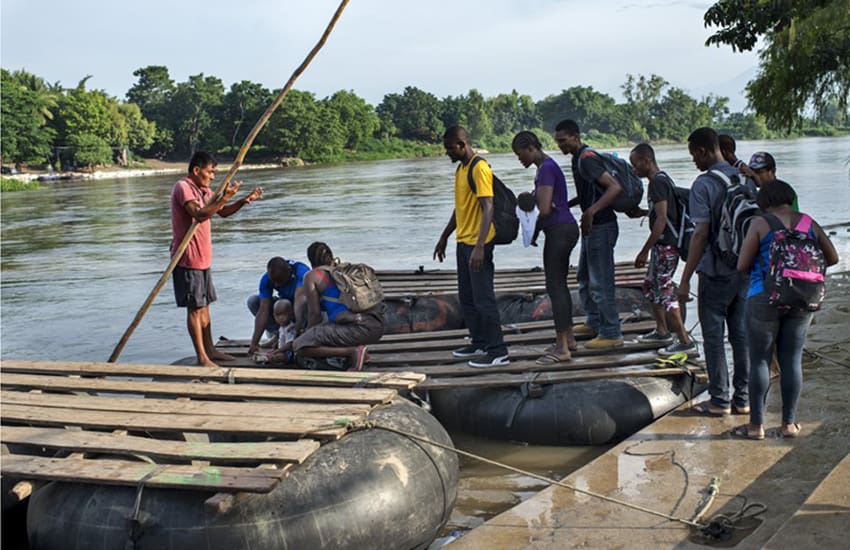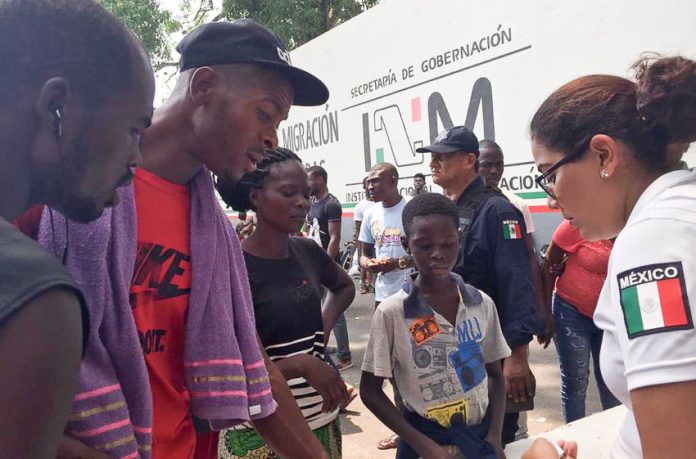Thousands of Haitian migrants are stranded in Tapachula, Chiapas, after large numbers of people from the Caribbean country crossed into Mexico via the southern border with Guatemala this week.
The newspaper Milenio reported that there has been a massive influx of Haitians in recent days and that some are sleeping on the streets of Tapachula because migrant shelters are full.
Since Monday, numerous groups of up to 60 Haitians have reached the southern border town of Ciudad Hidalgo after crossing the Suchiate River on rafts from Tecún Umán in Guatemala.
Taking advantage of the Haitians’ lack of Spanish language skills and their fear of being detained by authorities or attacked by criminals, raftsmen have charged the migrants five times the normal price — 100 pesos per person instead of 20 pesos — for transport across the river, Milenio said.
The migrants travel the approximately 40 kilometers from Ciudad Hidalgo to Tapachula on public transit. In Tapachula, the Haitians are applying for humanitarian visas at the Mexican Commission for Refugee Assistance (Comar) with the hope that they will be able to stay in Mexico legally and access economic help from UNHCR, the United Nations refugee agency.

Milenio said approximately 1,000 Haitians arrived at Comar offices in Tapachula every day between Monday and Thursday and estimated that some 4,000 migrants from Haiti, the poorest country in the western hemisphere, have crossed into the country this week via the southern border — which is ostensibly closed to nonessential traffic.
Among the migrants are many young men but also women and children, all of whom are exhausted when they reach Tapachula after long journeys from Central America, where they arrived on flights from Haiti. While they wait for their refugee applications to be processed, they are effectively stranded in Tapachula, which is straining under the pressure of the influx.
According to the president of an association that provides assistance to migrants, more than 11,000 — many of whom are Haitians and nationals of African countries — have been stranded in Tapachula since August last year.
“They’re waiting to be given asylum or refuge. They’re looking to stay in Mexico, but there is a delay in giving them a response and it’s causing a humanitarian crisis in Tapachula,” Jesús Cruz Buenrostro said.
More than 17,400 migrants were registered by Mexican immigration authorities in March, a monthly record. More than 3,100 accompanied minors were also registered by the National Immigration Institute (INM), which last week pledged to establish 17 additional shelters on the southern border in Campeche and Chiapas to provide temporary housing to migrants, including thousands of children.
The need for more shelters in Tapachula is clear. After arriving in the city, migrants from Haiti, Central American nations and other countries trudge through the downtown streets looking for cheap or free accommodation, but not all of them are successful.
The local newspaper El Orbe reported that shelters in Tapachula are full and that some 2,000 migrants are sleeping on park benches, city sidewalks or “wherever the night takes them.”
One rough-sleeping migrant who spoke with the newspaper said the INM is treating foreigners poorly and denigrating them for the situation they find themselves in. He said he had been sleeping on a bench near a shelter for almost two months, waiting for a bed to open up. However, shelters have reduced the number of migrants they are accepting due to the risk of coronavirus infection, which makes finding a bed even more difficult.
The migrant, identified only as Leonardo “N.,” also said there have been cases in which authorities have issued migration documents only to subsequently claim that they are invalid or false.
There are few work opportunities for migrants stuck in Tapachula, but some who have found jobs have been paid less than the minimum wage despite working long hours, he said. “There have been times when the employers refuse to pay … and threaten to call immigration,” he added.
